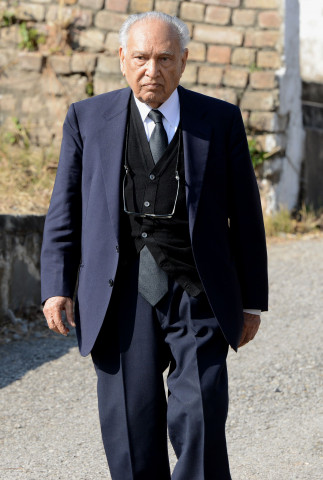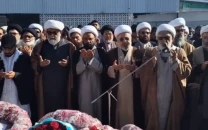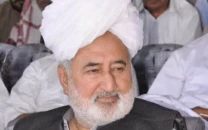Pakistan's Devil's Advocate says he's just doing his job
Lawyer Sharifuddin Pirzada has provided the legal cover for the country's succession of military rulers

Sharifuddin Pirzada PHOTO: AFP
He was secretary to Pakistan's founding father Muhammad Ali Jinnah in the 1940s, has been attorney general and foreign minister, and authored orders that gave legal weight to two coups d'etat.
Now aged 90, the dapper figure who is reviled by many pro-democracy activists finds himself in the limelight once again as the head of Pervez Musharraf's defence team, a role that could be his swansong.
Musharraf, the most recent of Pakistan's four military rulers, who was in power from 1999 to 2008, is facing treason charges relating to his imposition of a state of emergency in 2007.
Pirzada himself wrote the legal order for Musharraf's emergency rule, updating a similar one he prepared for General Zia-ul-Haq after his 1977 coup.
He rarely grants interviews, but spoke to AFP after a hearing in Musharraf's treason case. He scoffed at the idea that he is the lawyer of choice for autocrats.
"Certainly not," said the advocate. "I'm a professional lawyer and appear in cases and do my best."
He points to his key role in a 1972 Supreme Court verdict that declared Yahya Khan, Pakistan's second military ruler, a "usurper".
This came despite the fact that Pirzada had been attorney general for both Yahya and his predecessor Ayub Khan, Pakistan's first military ruler, whom he also served as foreign minister.
Later, he wrote oaths for judges sworn in by Zia and Musharraf that omitted the commitment to protect the constitution, and drew up documents based on the so-called "doctrine of necessity" to legalise both rulers' coups.
Regimes led to progress
He draws a clear distinction between political support and the exercise of legal expertise, and beams with professional pride when talking about the Supreme Court judgement that validated Zia's rule.
"That was a very nice judgement and has been appreciated elsewhere," he said, adding: "Not that I supported (Zia) or anything like that. I supported the legal position."
Zia went on to hang the man he ousted, former prime minister Zulfiqar Ali Bhutto, and began Islamist reforms that some analysts say contributed to the violent religious extremism the country faces today.
On Musharraf, Pirzada is reluctant to get into the details of the ongoing case, but insists his client is an "excellent man" and defends the record of the four generals who seized power.
"They are called dictators but these were administrators. The progress the country made was through some of these regimes. Some of the politicians were equally good -- (Zulfiqar Ali) Bhutto was good -- but both sides counted mistakes," he said.
Manipulating the judiciary
Pirzada began his legal career in the Bombay High Court before moving to the newly created Pakistan.
Now advanced in years and slightly built, he no longer cuts the same figure in the courtroom but maintains a godfatherly background role, murmuring guidance to junior lawyers.
Always turned out in an immaculate black suit, he usually sports the "Jinnah cap" favoured by the country's founder but now out of fashion, as he surveys proceedings with an even gaze.
Observers such as Ayaz Amir, a leading newspaper columnist, see his handiwork in the "broad outlines" of the Musharraf case.
Asma Jahangir, a top human rights lawyer and leading light among Pakistani liberals, decries the anti-democratic causes to which Pirzada has lent his support.
"He's a very skilful lawyer and we have no better authority on constitutional law. People could have been very good architects but built something for Hitler," she said.
Amir says the fact that Pirzada has achieved such sustained success "has not been so much in propounding brilliant or outstanding legal theories as in his knowledge of manipulating the judiciary".
Today, Pakistan's judiciary is seen as less pliant than in the past, energised by the successful lawyers' protest movement that reinstated judges sacked by Musharraf.
The country achieved its first ever democratic transfer of power at last year's general election, and another military coup is seen as a distant prospect these days.
But in a country ruled for more than half its life by the armed forces, the threat remains, however remote -- and in such a scenario the wily Pirzada could be called upon once again.
He certainly sees no reason to step down just yet.
"There are QCs (senior lawyers) and attorney generals who work till 98. I keep a normal life and am very in control of my timings," he said.



















COMMENTS
Comments are moderated and generally will be posted if they are on-topic and not abusive.
For more information, please see our Comments FAQ